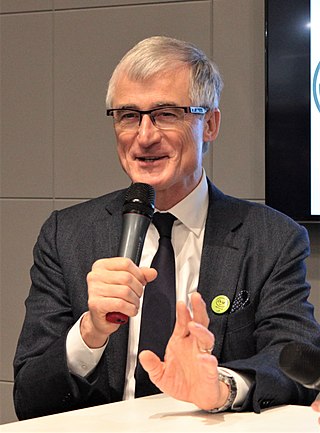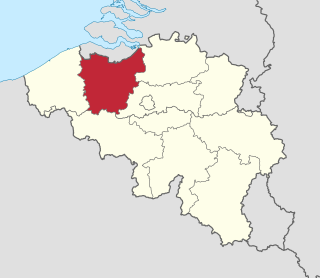
Flanders is the Dutch-speaking northern portion of Belgium and one of the communities, regions and language areas of Belgium. However, there are several overlapping definitions, including ones related to culture, language, politics, and history, and sometimes involving neighbouring countries. The demonym associated with Flanders is Fleming, while the corresponding adjective is Flemish, which is also the name of the local dialect. The official capital of Flanders is the City of Brussels, although the Brussels-Capital Region that includes it has an independent regional government. The powers of the government of Flanders consist, among others, of economic affairs in the Flemish Region and the community aspects of Flanders life in Brussels, such as Flemish culture and education.

Belgium is a federal state comprising three communities and three regions that are based on four language areas. For each of these subdivision types, the subdivisions together make up the entire country; in other words, the types overlap.

"De Vlaamse Leeuw" is the official anthem of Flanders, a region and community in Belgium.
Regional elections were held in Belgium, to choose representatives in the regional councils of Flanders, Wallonia, Brussels and the German-speaking Community on 13 June 1999. The regional elections were held on the same day as the European elections and the federal elections.

Elections in Belgium are organised for legislative bodies only, and not for executive functions. Direct elections take place for the European Parliament, the Chamber of Representatives, the Parliaments of the Regions, the Parliaments of the Communities, the provincial councils, the municipal councils and the councils of Districts of Antwerp. Voting is mandatory and all elections use proportional representation which in general requires coalition governments.

The Flemish Government is the executive branch of the Flemish Community and the Flemish Region of Belgium. It consists of a government cabinet, headed by the Minister-President and accountable to the Flemish Parliament, and the public administration divided into 13 policy areas, each with an executive department and multiple agencies.
Flemish Sign Language is a deaf sign language of Belgium. It is closely related to French Belgian Sign Language, but they are now generally recognized as distinct languages. VGT is estimated to include around 6,000 sign-language users.

Geert Albert Bourgeois is a Belgian politician of the New Flemish Alliance (N-VA), which he founded in 2001, who is currently serving as a Member of the European Parliament since 2019. He previously served as the Minister-President of Flanders from 2014 to 2019. Prior to this, he was a member of the federal Chamber of Representatives for the People's Union from 1995 to 2001, and then for the N-VA from 2001 to 2004. He has been involved in local and regional politics in Flanders since 1976.

The Flemish Heraldic Council advises the Flemish Government on all matters relating to heraldry. The Council was created on 11 April 1984, as the successor to the Subcommittee for Heraldry or Subcommissie Heraldiek, established in 1978. Its prime task was to supervise the granting of a coat of arms and a flag to all municipalities of the Flemish Region. Following the reorganization of the Belgian provinces, the council's field of action was extended to provincial arms and flags in 1994. Since 2000, the Council has likewise advised the Flemish Government on grants of arms to Flemish individuals and corporations. In the meantime, more than 200 such grants have received official sanction. Grants of arms by the Flemish Government are published in the Belgian official journal.

The 2009 European Parliament election in Belgium was on Sunday 7 June 2009 and was the election of the delegation from Belgium to the European Parliament. The elections were on the same day as regional elections to the Flemish Parliament, Walloon Parliament, Brussels Parliament and the Parliament of the German-speaking Community.
Regional elections were held in Belgium on 7 June 2009 to choose representatives in the regional parliaments of Flanders, Wallonia, Brussels and the German-speaking Community of Belgium. These elections were held on the same day as the European elections.

Federal elections were held in Belgium on 25 May 2014. All 150 members of the Chamber of Representatives were elected, whereas the Senate was no longer directly elected following the 2011–2012 state reform. These were the first elections held under King Philippe's reign.

Federal elections were held in Belgium on 26 May 2019, alongside the country's European and regional elections. All 150 members of the Chamber of Representatives were elected from eleven multi-member constituencies.

The 2019 Belgian regional elections took place on Sunday 26 May, the same day as the 2019 European Parliament election as well as the Belgian federal election.

Limburg is a parliamentary constituency in Belgium used to elect members of the Flemish Parliament since 2004. It corresponds to the province of Limburg.

Antwerp is a parliamentary constituency in Belgium used to elect members of the Flemish Parliament since 2004. It corresponds to the province of Antwerp.

East Flanders is a parliamentary constituency in Belgium used to elect members of the Flemish Parliament since 2004. It corresponds to the province of East Flanders.

Flemish Brabant is a parliamentary constituency in Belgium used to elect members of the Flemish Parliament since 2004. It corresponds to the province of Flemish Brabant.

















